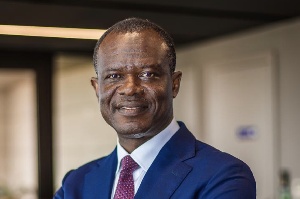Business News of Friday, 16 May 2025
Source: www.ghanawebbers.com
Cedi stability backed by organic, non-debt creating reserves - BoG First Deputy Governor
Dr. Mumuni Zakaria, the First Deputy Governor of the Bank of Ghana, spoke about the cedi's recent rally. He stated that this rise is not due to artificial support from the central bank. Instead, it results from strong reserves that do not create debt.
He explained that the central bank has found a way to meet market demand without using its foreign exchange reserves. Dr. Zakaria told host George Wiafe that if they heavily supported the market, their reserves would suffer.
Under the IMF program, he noted significant reserve accumulation. He described Ghana’s reserve performance as “very, very impressive.”
According to him, they have already met the IMF target for reserves. The target was three months of import cover; Ghana is now at 3.7 months using IMF metrics. Including petroleum funds raises this to 4.7 months.
Dr. Zakaria rejected claims that the central bank is depleting reserves to support the cedi. He said if this were true, market players would notice and lose trust quickly.
He emphasized that current reserves are not based on debt or short-term inflows. These are organically accumulated reserves; by April, they exceeded $10 billion and may reach $11 billion by June.
This level of accumulation exceeds expectations under the IMF program and boosts market confidence. Dr. Zakaria highlighted that this situation represents a fundamental shift in reserve management.
He insisted that the cedi rally involves more than just reserves alone. The IMF Staff Level Agreement has sent a strong signal globally, while inflation has decreased from nearly 24% to 21.2%. Additionally, government borrowing is slowing due to fiscal consolidation.
The Bank of Ghana's aggressive liquidity management also plays a role in this stability. Dr. Zakaria mentioned they have sterilized three times more liquidity than last year.
This indicates they are not flooding the market with cedi liquidity while still meeting forex demand effectively. He described their approach as balanced and effective.
“We are not intervening recklessly,” he stated, emphasizing strategic support for the market while building buffers.
The results show improvement in their position today, and he expressed determination to maintain it moving forward.











